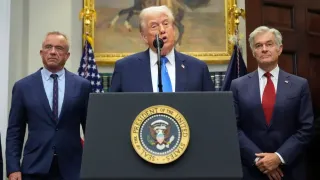
Apr 24
North Dakota's GOP Governor Vetoes Expanded Library Censorship Bill
Jack Dura READ TIME: 3 MIN.
North Dakota's Republican governor on Wednesday vetoed bills to further restrict sexual content in libraries and to create a private school voucher program, rejecting two measures that have seen widespread support by GOP governors in other states.
The GOP-led Legislature can override Gov. Kelly Armstrong's veto by a two-thirds vote in each chamber: 32 votes in the Senate, and 63 in the House. Neither bill garnered such support on their paths to Armstrong's desk.
The library bill would have expanded North Dakota's 2023 prohibition on "explicit sexual material" in public libraries to school districts, and require those entities to have policies for relocating such material "to an area in the library not easily accessible to minors." The bill also mandated that libraries have technology to stop K-12 students from accessing certain online content, and required local prosecutors to weigh in on alleged violations of the state's restrictions.
In his veto message, Armstrong said the bill "represents a misguided attempt to legislate morality through overreach and censorship. The bill imposes vague and punitive burdens on professionals and opens the door to a host of unintended and damaging consequences for our communities."
He also said the bill "is redundant, overly burdensome, and places local librarians, school districts, and state's attorneys in an untenable situation."
Supporters said the bill would protect minors from the harmful effects of books they say are pornographic or obscene. Examples they have cited are books with LGBTQ themes. Opponents said procedures are already in place and called the bill government overreach.
Bill sponsor and Republican Sen. Keith Boehm declined to comment on the veto. The Associated Press sent a message to Republican Senate Majority Leader David Hogue asking about a possible override attempt.
Book banning legislation has caught on in recent years in Republican-led states such as Arkansas, Idaho, Iowa, Florida and Missouri, said Jonathan Friedman, managing director of U.S. free expression programs at PEN America. Some communities and lawmakers in recent years have sought to advance what he called a "censorship agenda" largely motivated by an anti-LGBTQ animus, he said.
The voucher bill sought to create an income-based " education savings account program " administered by the state-owned Bank of North Dakota, with $21.7 million for the next two-year budget cycle. The money could be used for tuition at private schools, textbooks, technology costs and other expenses, first available for the 2026-27 school year.
In his veto message, the governor said that while his administration "strongly supports expanding school choice," the bill "falls far short of truly expanding choice as it only impacts one sector of our student population. Voucher debate aside, this legislation still needs work to address implementation issues. We get one chance to craft policy to benefit the most students and ensure implementation of the program is achievable and realistic."
Proponents said the bill lets parents pick the best form of education for their children.
Rep. Ben Koppelman, who sponsored the measure, said he is "confident that most red-state governors would have signed that bill, and we'll just be back next time around to do it again."
Republican House Majority Leader Mike Lefor said he would talk to his caucus about whether to attempt an override.
Opponents said the state shouldn't give public money for private education. Others cite a state constitutional prohibition that states: "No money raised for the support of the public schools of the state shall be appropriated to or used for the support of any sectarian school."
The governor's proposed two-year budget included $44.3 million to start an educational savings account program "to fund supplemental services through a digital wallet that reimburses for approved services and supports and expands educational opportunities for public, non-public and homeschool students."
The House has yet to vote on another bill with a similar concept. Armstrong called that bill "an available vehicle to combine the best parts of both bills."






